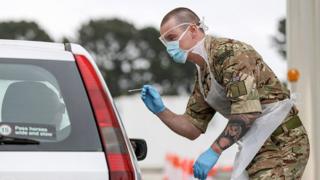Coronavirus: What tests are being done in the UK?
 Image copyright
MOD / PA
Image copyright
MOD / PA
Health officials in England have approved a test that will show if someone has had coronavirus in the past. So how is the government's testing strategy developing?
The new test - from Swiss pharmaceutical firm Roche - looks for antibodies in the blood to see if a person has had the virus and might now have some form of immunity.
The government has been looking for a reliable antibody test for some time. At the end of March, Health Secretary Matt Hancock announced that the government had bought 3.5 million antibody tests but these turned out to be ineffective.
If the Roche test becomes available in large numbers, it might first be used on health and social care staff.
There is an antibody test already in use at government research facility Porton Down, to make early estimates about what percentage of the population might have had the virus. But it is not accurate enough to give individuals information about their infection status.
There are also questions over how long immunity lasts. There is no evidence people who have recovered from COVID-19 and have antibodies are protected from being infected again, the World Health Organization (WHO) says.
What about the other type of test?
The Roche test is the "have I had it?" test.
The daily government update on testing refers to the "do I have it now?" test.
Those tests, which take a swab up your nose or from the back of your throat, have been the main focus of the government's efforts so far.
Who can get tested - and where?
At first, across the UK, the focus was on the sickest patients in hospitals, followed by health, care and emergency services staff, then other essential workers and their families.
Most recently in England, testing has been expanded to include anyone with symptoms who is:
- over 65
- cannot do their work from home
- living with those identified above
And residents and staff of care homes in England can be tested even if they don't have symptoms. There have been serious problems containing the outbreak in care homes.
Key workers across the UK who are self-isolating because they or a family member have coronavirus symptoms can be referred for a test by their employer or apply online.
Those eligible can either attend a regional test site, or ask for a home test kit - although these have been in short supply.
If a test is negative, a key worker can return to work if they are well enough, have not had a high temperature for 48 hours, and those living with them test negative.
At first the British Medical Association said the accessibility of centres was a major problem, with some people having to drive hundreds of miles to their nearest site.
New testing centres have since been made available, although they still require people to have access to a car and someone to drive them - or be well enough to drive themselves.
The army was also enlisted to provide pop-up testing facilities in sparsely-populated areas far away from any of the main sites.
What was the 100,000 target?
The government set a target of 100,000 coronavirus tests per day across the UK by the end of April, and managed to log 122,347 tests on 30 April.
But it was criticised for including in this figure about 40,000 testing kits which are counted when they are sent out.
The target was also met on 1 May. It was missed for eight consecutive days after that before being met again on 10 May.
On 12 May, 87,063 tests were logged for 61,741 people (this figure is lower as some people need more than one test).
Now the government is working towards a fresh target to get to 200,000 tests a day by the end of May, but this figure seems to refer to testing "capacity", not the actual number of tests carried out.
Why is testing important?
People are tested to diagnose them individually, but it can also be used to understand how far the virus has spread in the population.
Tests help people, including NHS workers, know whether they are safe to go to work, but wide testing can also let the health service plan for extra demand, and inform government decisions around social distancing and lockdowns.
For this reason, an initial 20,000 households in England will be tested every month for a year - for active coronavirus infections and for antibodies indicating a past infection.
Has the UK been too slow in testing for coronavirus?
The UK significantly increased its testing capacity throughout April, but lagged behind many other nations. Germany, for example, was regularly averaging 100,000 tests a day, by the start of April.
The UK did not start with the resources to do mass testing, unlike some other countries.
But it also took several weeks to expand from an initial eight public health laboratories to a wider network of private and university labs.
Unlike the UK, countries like Germany and South Korea rapidly stockpiled kits and made the test available to a larger number of labs.
Follow Rachel on Twitter
What do I need to know about the coronavirus?
Have you been tested? Or are you waiting for a test?
Please include a contact number if you are willing to speak to a BBC journalist about your experience.